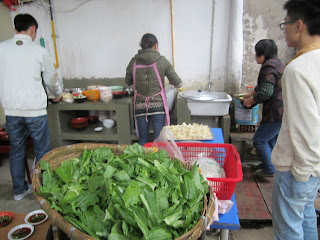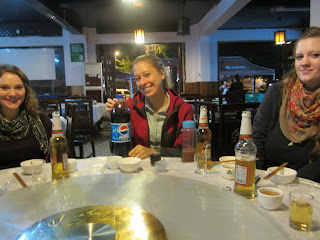All week my students were talking about the new Chinese custom of singles day, guāng gùn jié; a day of frenzied online shopping where popular retail websites offer cannot-pass-up deals, limited timed offers, and other irresistible enticements, racking up obscene financial gains that would make any capitalist cry with joy.
What my students can't explain is if this day is a celebration of the solo life. I have some doubts about this day because it seems counter productive for singles who want to be in a relationship to spend the day, alone, in front of the computer.
Me: "So, are you single?"
Girls: "YES!"
Me: "Why don't you have boyfriends?"
Girls: "giggle, giggle, no boys here and we want mature boys."
Me: ...hmmm, mature boys?
It's true there are few male students at this university; each of my classes only has 4 or 5 boys to 25 girls, and it's because this is a foreign languages school. The Chinese believe that boys are bad at learning foreign languages. This is a widely held belief and I even hear the teachers say it, including male teachers who are fluent in several languages.
Another Chinese belief is that girls must marry an older guy; he cannot even be a day younger. My students tell me 5 to 10 years older is best, and they absolutely will not consider even dating a younger guy. This comes up over and over. For example a few weeks ago, I met a recently graduated guy with a great job at another university who was miserable because the girl he likes is a year older than him. He knows it's hopeless.
I've heard variations on this reason: the girls want a guy to take care of them and honor them. Basically, it sounds like they want a guy to do their bidding. One girl was bragging about how great her boyfriend is because he'll drop everything and run out to get her food anytime she's hungry. That seems a little extreme, but who knows? On a daily basis, I see guys carry the girl's purse and bags everywhere. American guys? Are you taking notes here?
 |
| This foreign appliance cost almost $100, and caused considerable confusion about it's use. Ultimately, our explanation was filmed for future showings |
How did I spend singles day? Most PCVs are on the ultimate solo mission, but we are surrounded by a community and we try like crazy to integrate. In the morning, exPCV Jason and I went to an English Corner with an "American style coffee shop" theme. We taught them how to make coffee that they refused to drink, and then we went to a banquet lunch. Later, I went to dinner with 2 students. I talked all day, but I did no shopping.
 |
| Jason explains how to make coffee, he doesn't even drink coffee. Our version involved the microwave. |
 |
| lunch banquet, always too much food |
 |
| "Jack" my counterpart teacher, also owns a successful translation business |
 |
| some of Jack's employees and clients Everyone's chopsticks go from the dishes to mouth, and back again. The little bowels: for rice. |











































